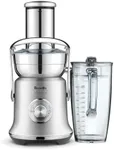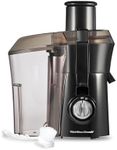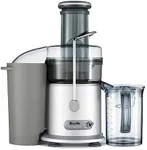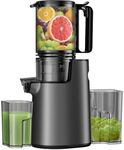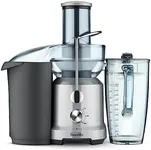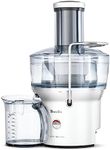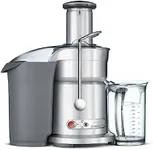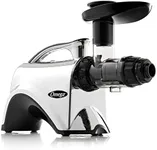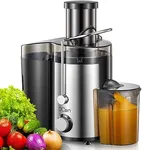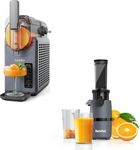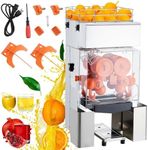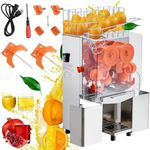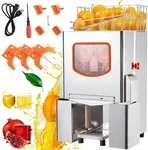Buying Guide for the Best Juicer For Carrot Juice
Choosing the right juicer for making carrot juice can significantly impact the quality and ease of your juicing experience. Carrots are tough and fibrous, so you need a juicer that can handle them efficiently. Here are some key specifications to consider when selecting a juicer for carrot juice, along with explanations to help you make an informed decision.Type of JuicerThere are mainly two types of juicers: centrifugal and masticating (also known as slow juicers). Centrifugal juicers are faster and more affordable, but they may not extract as much juice from carrots and can produce more foam. Masticating juicers, on the other hand, operate at a slower speed, which helps in extracting more juice and preserving nutrients. If you prioritize juice quality and nutrient retention, a masticating juicer is a better choice. However, if you need something quick and easy to use, a centrifugal juicer might be more suitable.
Motor PowerMotor power is crucial for juicing hard vegetables like carrots. A juicer with a powerful motor can handle tough produce more efficiently and reduce the risk of clogging. Motor power is usually measured in watts. For centrifugal juicers, look for a motor with at least 700 watts. For masticating juicers, a motor with 150 watts or more is generally sufficient. If you plan to juice frequently or in large quantities, opting for a higher wattage can ensure better performance and longevity.
Juice YieldJuice yield refers to the amount of juice extracted from the produce. Higher juice yield means more juice and less waste. Masticating juicers typically offer a higher juice yield compared to centrifugal juicers. When comparing models, look for reviews or specifications that mention juice yield. If you want to maximize the amount of juice you get from your carrots, a masticating juicer is usually the better option.
Ease of CleaningJuicers can have multiple parts that need to be cleaned after each use. Some models are easier to disassemble and clean than others. Look for juicers with dishwasher-safe parts or those that come with cleaning brushes. If you prefer a hassle-free cleaning process, consider a juicer with fewer parts and simple assembly. Reading user reviews can also give you an idea of how easy or difficult a juicer is to clean.
Size and StorageJuicers come in various sizes, and it's important to consider the available space in your kitchen. Larger juicers may offer more features but can take up more counter space. If you have limited space, look for a compact model that can be easily stored when not in use. Additionally, consider the size of the feeding chute; a larger chute can save you time by reducing the need to pre-cut your carrots.
Noise LevelJuicers can be noisy, especially centrifugal models. If noise is a concern for you, look for juicers that are specifically designed to operate quietly. Masticating juicers are generally quieter than centrifugal juicers. If you plan to juice early in the morning or late at night, a quieter model can be more convenient and less disruptive.
Durability and WarrantyDurability is an important factor, especially if you plan to use your juicer frequently. Look for juicers made from high-quality materials like stainless steel or BPA-free plastic. A good warranty can also provide peace of mind and protect your investment. Check the warranty terms and what it covers, as this can vary between manufacturers. A longer warranty period is often an indicator of the manufacturer's confidence in their product's durability.

